Star Trek TOS - Season 2 - Episode 25
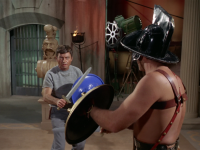
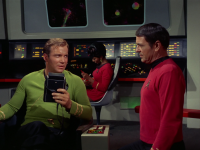
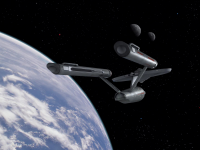
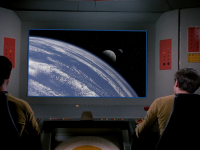
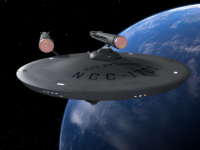
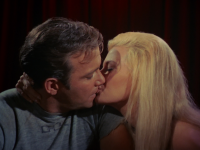
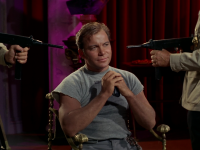
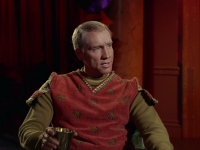

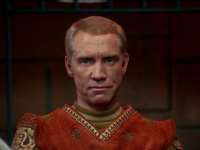
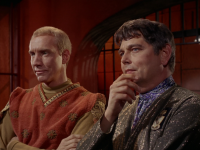
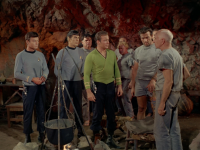
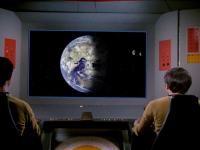
Star Trek TOS - 2x25 - Bread and Circuses
Originally Aired: 1968-3-15
Synopsis:
Spock and McCoy are forced to fight in Roman-like games. [Blu-ray] [DVD]
Filler Quotient:
3, bad filler, totally skippable.
- One of Star Trek's worst episodes and complete filler.
Problems
- "Hodgkin's Law of Parallel Planetary Development" is patently ridiculous. It's not a sound premise to build an episode off of.
Factoids
- This episode is a candidate for my "Worst Episode of TOS Award."
- 37 million died in Earth's third world war according to Spock.
- Kirk and McCoy define the Prime Directive in fairly specific language in this episode: "No identification of self or mission. No interference with the social development of said planet. No references to space or the fact that there are other worlds or civilizations."
- This episode establishes that the dematerialization process of the transporter insulates the target from projectile attacks like gunfire.
Remarkable Scenes
- Guy with a gun to Spock: "What do you call those?" Spock: "I call them ears."
- McCoy and Spock arguing about logic in the jail cell.
- McCoy and Spock arguing at the dinner table.
- Spock's terrific performance as a gladiator.
- McCoy and Spock arguing in the jail cell again.
My Review
Miri, The Omega Glory, and now Bread and Circuses. Why do alien planets mysteriously take on specific and precisely identical characteristics of Earth cultures seemingly at random so frequently? Why, "Hodgkin's Law of Parallel Planetary Development" of course! I applaud the episode for at least trying to come up with an explanation for this nonsense, but unlike the meddling of John Gill from Patterns of Force, this rationalization doesn't quite work. The very idea of something like "Hodgkin's Law of Parallel Planetary Development" existing as a natural law flies in the face of realism. There's just no way an alien planet, even an alien planet full of human-like aliens, is going to develop its own Roman Empire precisely identical to ours in nearly every way, except with 20th century American English, 20th century American technologies, and other such specific references.
It's kind of a shame too, because unlike Miri and The Omega Glory, this was a pretty entertaining episode. Sure it was a story about yet another Federation citizen tainting a society with yet another alien race that looks exactly like humans and yet another set of plot contrivances which exist solely to get the cast captured and forced to fight for the amusement of others, but when you set aside the cliches, this episode actually has a lot to offer. The idea of a Roman Empire which never fell and became much like the 20th century United States is intriguing. In this fictional society, slavery evolved into some form of wage slavery and the gladiator games were broadcast live on television with a characteristically familiar obsession with television ratings. Sure these details are gimmicky, but they're also pretty damn funny.
And then there's Claudius Marcus, who is one of the most delightfully amusing villains we've yet seen on Star Trek. Unlike most victims of cultural contamination by superior aliens, Claudius has no interest in procuring the advancements of the Federation for himself or his society. Instead, he perversely gets off on holding the Federation hostage to its Prime Directive. He even hilariously taunts Kirk by admitting that while he's well aware that the Enterprise could lay waste to the entire planet from orbit, he also knows Kirk is legally prohibited from doing so. He then spends the whole episode toying with the crew like a cat would with a bird for no reason other than his own amusement. On some level, you've got to respect that carefree recklessness. Finally, there are also several great moments featuring McCoy preying on Spock's insecurities about his human side, which was a nice touch.
But the fun ends there. And aside from the obnoxious issues with the episode's premise mentioned at the beginning of the review, there are also problems with its internal plot logic as well. Perhaps the most prominent example is the plot's bizarre dismissal of sun worship as not historically consistent with Roman theology. Apparently the writers have never heard of Sol Invictus. Likewise, the plot's dismissal of sun worship as a symptom of a primitive society while elevating the idea of worshipping the (alleged) son of god as a characteristic of an advanced society is downright offensive. Why should one religion be considered more valid than another? The way the story ends, after Uhura's exposition about the sun vs. son wordplay, everyone seems to rest easy by concluding that now that the aliens discovered Christianity, all the problems with their society will soon end.
That's an ending which aside from the sheer ridiculousness is hardly in the spirit of Star Trek which, for the most part, seems to advocate a progressive future without superstition guiding society's laws and moral code any longer. It's as shameful for Star Trek to resort to such blatant Christian evangelism as it is for Star Trek to tell a science fiction story on such a painfully weak premise as "Hodgkin's Law of Parallel Planetary Development." Do yourself a favor and skip this one.

The following are comments submitted by my readers.
The episode also explores the relationship of the trio and Spock’s true feelings for Kirk more than most other episodes did (The Tholian Web is one other in which this is done expertly). Spock coming as close to admitting that he cared for Kirk (by denying McCoy’s accusations of not having feelings in a way) – it is wonderfully done, very much in character for Spock. The same happens in The Tholian Web, when Spock answer’s McCoy’s “It does hurt, doesn’t it” with “What would you have me say.” Such good writing!
I therefore love the McCoy/Spock arguments in the jail cell. This and Spock “kicking some Gladiator ass” made me give this episode quite a good rating.
This is a dull episode. For a modern day Rome, the city seemed pretty dead (except for the shaky of urban 1960's file footage). Everything just seemed like an excuse for a fighting sequence. One scene that WAS exceptional was the emotional conversation Spock and Mccoy had in the jail cell. It was remarkable.
The reviewer missed the mark here. Just because there is a Christianity theme here doesn't mean it is evangalism, nor does it interfere with the progressive nature of the show. Historically, the Roman empire succumbed to Christianity and adopted it. So I think the reviewer places too much criticism on this point, when the purpose of the episode was to explore a world where the Romans actually maintained their empire into modern times. This episode is very entertaining and one most remember as a kid. Give it a 6.
I've read some pretty disparaging reviews of this episode, and while some of the science is a little screwy, I think there's some truly wonderful character work in it. This is Kirk at his most Kirk-like...confident, in charge, watching out for his crew but trusting them as well. I was getting tired of too many angsty, doubt-ridden, weak Kirk moments. Kirk is a strong, totally in control leader all the way through, and it's awesome.
Spock lets some emotion out--irritation, humor, anxiety--and gets called on it by McCoy, leading to a deeply emotional moment between the two as they share their concern for Kirk. McCoy is at his most bitchy and in Spock's face all the time, but still prods Spock to new levels of self disclosure.
I'm not thrilled with the treatment of the Prime Directive--up till now, didn't we understand that the PD was absolute unless they had to defend themselves? How can there possibly NOT be an exemption for that?
And I do sort of wish that Kirk hadn't sexed the slave...can he NEVER resist a woman EVER? I mean, she was a SLAVE, she can't give free consent! A new low for studly Kirk.
The Sun/Son thing, indicating that Christianity arose within the Roman Empire in this reality as well, makes sense, and I understand why they couldn't really follow up on it. It was a neat little twist that could have been more, but it's okay that it wasn't. It didn't bother me.
On a personal note, speaking as a woman, these men in these costumes are so hot I watched the episode 3 times in one day. Spock fighting in the arena in those tight pants? Whew... And I didn't realize McCoy was so tall, but he's almost as tall as Spock. Add the emotional intensity, and it was a pretty satisfying episode, despite the occasional plot ridiculousness.
Anyway, good character work...
"It's kind of a shame too, because unlike Miri and The Omega Glory, this was a pretty entertaining episode. Sure it was a story about yet another Federation citizen tainting a society with yet another alien race that looks exactly like humans and yet another set of plot contrivances which exist solely to get the cast captured and forced to fight for the amusement of others, but when you set aside the cliches, this episode actually has a lot to offer. The idea of a Roman Empire which never fell and became much like the 20th century United States is intriguing. In this fictional society, slavery evolved into some form of wage slavery and the gladiator games were broadcast live on television with a characteristically familiar obsession with television ratings. Sure these details are gimmicky, but they're also pretty damn funny."
This is all quite true, which makes your overall episode rating of 0 a bit baffling. Zero? Not one point? Huh...
Lots of problems, to be sure, but even you seem to see at least some entertainment value. And you've rated other episodes more highly while apparently finding much loss to say in their favor. I guess I'm just wondering what's up with that.
It doesn't matter how charming the villain was or how amusing certain plot details were. The premise was fundamentally unworkable. I don't award points to episodes with fundamentally unworkable premises.
BREAD AND CIRCUSES
Factoid: Ian Wolfe, who played Septimus here, also played Mr. Atoz in "All Our Yesterdays".
OK, here's my chief question about this episode:
Just how did Kirk et al. expect to get to Captain Merik and haul him away? The closer they get, the more likely they are to be caught -- especially with Flavius Maximus, perhaps the most recognizable slave on the planet, leading the way! (Flavius should at least wear a disguise.) And they're somehow going to keep an entire machine gun-toting police force at bay while they question Merik? Even if they used their phasers, chances are _someone's_ bullets would get them.
And why did our heroes beam down in Federation garb?
What was Claudius Marcus doing by an iridium quarry?
Great discussion with Bones and Spock in the cell. And other fun moments here and there, as already mentioned by others.
I think this is the strictest application of the Prime Directive in the entire series. No chance at all for Spock to ask Kirk at the end of the episode if they violated it. Even in "The Omega Glory", where Kirk enters into his log, "A star captain's most solemn oath is that he will give his life, even his entire crew, rather than violate the Prime Directive", Spock gets to question Kirk about their actions at the end.
Let's see, in real Rome there's the huge Colosseum. Here we have a tiny TV studio.
Notice that when Kirk fires at the cell door lock, nothing hits it!
CLAUDIUS: Question, Captain?
KIRK: The rules. If Spock should finish his man off first, would he be able to help
CLAUDIUS: We believe men should fight their own battles. Only the weak will die. My word as a Roman. Ready to order your men down, Captain?
Why this is a surprise to anyone is beyond me. On the other hand, why have two fights at the same time? What is Spock supposed to do when he finishes his opponent off first? Just stand there and watch? Walk off stage? Wave to the crowd?
MERIK: Maybe now you understand why I gave in. The Romans have always been the strongest, and they've had practice for over two thousand years in enslaving men, using them, killing them.
Hmmm. I wouldn't want to serve under this dude! And I don't follow his reasoning.
CLAUDIUS: Quite true, Captain Kirk. The games have always strengthened us. Death becomes a familiar pattern. We don't fear it as you do.
"We don't fear [death] as you do?" I don't see Claudius volunteering to fight. Ridiculous. Not fearing death gets weeded out by natural selection.
Amazing how well Scotty's power disruption was timed! Virtually down to the second!
Here's one thing that violates Hodgkin's law: Kirk's night with Drusilla. Bizarre.
The wikipedia article on Roddenberry says that "he . . . considered himself a humanist and agnostic. He saw religion as the cause of many wars and human suffering." Yet he co-wrote this episode, which favors Christianity! Go figure.
A zero? You'd rather watch "The Empath"? Other than that, I mostly agree with your review.
AEF, aka betaneptune
Your review is too biased. You only give this a 0 because you're biased against Christianity. This much is clear. If you truly understood the spirit of star trek you would have caught the meaning.
At the end, McCoy said the 'sun' philosophy was "A philosophy of total love and total brotherhood." Then they all smiled, knowingly. Clearly, the united federation of planets is based on such a philosophy.
Part of that philosophy is also to respect others. By not keeping your bias out, this is why your review fundamentally fails in our terms, and as well on the spirit of Star Trek.
What are you on about? The ending of this episode was just oozing with Christian evangelism. It's hard to miss. As for my "bias" against evangelizing Christianity, I can well assure you that had any other religion been as shamelessly evangelized in this fashion, I'd be equally annoyed.
You missed the point of what i was trying to explain. The point I was trying to make was that this episode gave us insights into some of the very root philosophies in the united federation of planets. All of the people on the bridge, in the scene at the end of 'Bread and Circuses', understood what was happening on the planet after Uhura explained it wasn't the 'sun' but the 'son'. They all had understanding expressions of what that implied.
Kirk said "Caesar and Christ. They had them both. And the word is spreading only now." Then McCoy said in understanding "A philosophy of total love and total brotherhood." To which Spock also understood by saying "It will replace their imperial Rome, but it will happen in their twentieth century." Then kirk longlingly says "Wouldn't it be something to watch, to be a part of? To see it happen all over again?". His line shed light on an understanding that he had which we don't have. Perhaps that philosophy was the key one that helped bind people after the 3rd world war, and/or was a basis of the united federation of planets.
In TOS season 3, the episode 'Whom Gods Destroy', when Garth was mocking the peace mission to Axanar, Kirk said "They were humanitarians and statesmen, and they had a dream. A dream that became a reality and spread throughout the stars, a dream that made Mister Spock and me brothers." Garth asked Spock if he agreed and Spock said "Captain Kirk speaks somewhat figuratively and with undue emotion. However, what he says is logical and I do, in fact, agree with it."
'Bread and Circuses' is a very powerful episode that sheds light on some deep roots about the philosophy of the united federation of planets, a philosophy of total love and total brotherhood. It showed that both humans and vulcans understand this philosophy is a stable ground to build on. It just so happens to be one of the deepest philosophies of this planet as well, now, and today, in real life.
So this is why i strongly disagree with your 0 for this episode, because it showed us a bit about how their world got to where it was, and it ranks least a 7 imho.
That has got to be the most generous interpretation I've ever seen for any episode of Star Trek. Personally, I think you're reading way too much into it (as would most other people I suspect).
But that's not really what's important here. Regardless of whether or not there is supposed to be some deep spiritual insight in this story about the Federation's origins if you read between the lines hard enough, it doesn't really matter.
What matters is the entire story was implausible from the very first moment. "Hodgkin's Law of Parallel Planetary Development" is scientific rubbish, unworthy of a science fiction.
The story was entertaining, but we should not award points to blatant pseudoscience.
It's cornball, the core premise is painfully implausible, and there's a shamelessly manipulative appeal to shallow, majoritarian morality -- perhaps to mitigate earlier episodes that offended by purveying what was perceived by some as communitarian, even anti-capitalist ethics.
With two liberal Jewish actors in the lead roles, there may have been some overcompensation going on, perhaps to blunt criticism that Star Trek was internationalist, Social-Democratic propaganda. There were a few episodes in season 2 and 3 - "Omega Glory" being the most obvious - that struck me this way.
But the episode doesn't warrant a zero by any standard. There's solid acting, and some unusually strong character development for the series. The notion of 20th century Rome is a clever one, and the writers did pretty well fleshing it out in a 50-minute window.
If the core premise was painfully implausible, that's it. It doesn't matter how good the actors were or how entertaining the villain was. It can't be worth any points if the core premise was painfully implausible.
I find Voy: Threshold to be highly entertaining. One of my favorite zeroes to rewatch. Absolutely chock full of comedy, both intentional and unintentional. But I don't give it any points either because it's equally implausible.
"BREAD AND CIRCUSES" post #2:
Notice that in the news broadcast at the beginning of the episode, one of the fighters is Claudius Marcus! Is that our "delightfully amusing villain," or someone else with the same name?
In my first post I said this was probably the strictest application of the Prime Directive in the series. Actually, this is _not_ true at the beginning of the episode. Quite the opposite, in fact!
Our heroes beam down in Federation garb and bring their phaser guns. Spock brings his tricorder and bones brings his own device. Kirk tries to grab his phaser when our heroes are first caught by the escaped slaves, he uses his communicator to ask Scotty to count people from afar, and Bones examines the natives with his little cylinder thing. And all this starts less than a minute after Kirk and Bones recite the PD!
Add to that the following:
KIRK: Perhaps you've heard, let's say, an impossible story or a rumor of men who came from the sky or from other worlds.
SEPTIMUS: There are no other worlds.
KIRK: The stars.
SEPTIMUS: Lights shining through from heaven. It is where the sun is. Blessed be the sun.
When Kirk and Bones recite the P.D., they're doing it for our benefit, not Spock's, of course. But surprisingly it doesn't come out all that awkward.
This is one of the few episodes where the unexpected speaking of English is mentioned and remarked upon. The other episodes include "Tomorrow is Yesterday" and "Metamorphosis." Any others? I wish I had a text file of each transcript! It would make questions like this quite easy to answer (well, assuming no typos, of course).
As for sun worship in the Roman Empire: Why can't there be something that's not exactly "paralleled"? That would be more likely than everything being paralleled, no? Not "illogical" in my opinion.
Re "pseudoscience": In TOS, phasers and photon torpedoes somehow make sounds in the vacuum of space, which is not possible. (They sound pretty cool, though!) Faster-than-light travel is almost certainly a no-go. (If you learn the theory of special relativity and how well confirmed it is, you will see why.) And see my list of absurdities in my review of "Sky is Hollow." But I watch Star Trek for fun, the characters, the great chemistry between the characters, how they deal with situations, action sequences, interesting ideas and such. Keep in mind that there's only so much you can do with the limited time and money they had to work with (hence, Hodgkin's Law of Parallel Development). Sometimes it's either Hodgkin's Law or nothing. ... In spite of all this, I still love the show.
I agree that Bones saying, "We represent many beliefs," is hardly characteristic of an enlightened future. But it does represent enlightened _tolerance_.
SPOCK: Sun worship is usually a primitive superstition religion.
Current religions are, in part, modern-day superstition. He said nothing about any religion's validity -- just that sun worship is characteristic of primitive societies. And some religions are sillier than others. Why would they be all the same?
Yeah, the evangelism bit at the end is pretty obnoxious and cringe-worthy. And ironic in that Shatner and Nimoy are both Jewish.
>----o----<
To Strider - Kirk weak? He's only human and it's nice to see he has _some_ weaknesses. And I always rooted for Spock when he played Kirk in chess, and was always a little annoyed when Kirk won. But he's still our hero.
On Kirk resisting women: he resisted Eve in "Mudd's Women," Helen Noel in "Dagger of the Mind," and Dr. Wallace in "The Deadly Years." (I assume you meant women who were after him. OK, it's not clear what happened with Eve. I suspect some random rewriting occurred.) Oh, and there's Yeoman Rand! He resisted the Dohlman in the end, and without McCoy's cure. He resisted almost all the women that weren't after him.
AEF
Actually there is nothing in real-life science proclaiming that humanoids and even a duplicate of the Roman Empire could not evolve on another planet.
*rolls eyes*
An absolutely stupid episode which should have been burned on a pyre!
I'm really confused as to how it was even cleared for production by Roddenberry knowing his feelings on religion!
I view the man much like myself or most of our Founding Fathers... a Deist.
The show was a complete amalgam of nonsense and stupidity!!!
... and my eyes rolled at Derek's comment along with yours!
I don't agree with your implication that Christianity is superstition, but to each his own.
UGH. The implication that these egalitarian pacifists were actually Christians, and that this is a good thing, utterly turns my stomach. Keep that obscene Christian filth out of my good, wholesome Star Trek! (Didn't Big J say something about not bringing peace, but a sword, and setting brother against brother? Didn't he also conspicuously fail to condemn slavery? But I digress.) Plus, all of this misunderstanding is hinging on a PUN? Son/sun? I wonder how they translate that whole thing into any other language.
I could barely believe it. I thought it was a misdirect at first. But no, here's my beloved Star Trek, otherwise famously secular and humanistic, suddenly condoning one of the most backwards, brutal, destructive, illogical, asinine, insane belief systems ever devised by our species. Sure, you can give the writers the benefit of the doubt and interpret this to mean that these people were about to go through their "Christian phase," so to speak, presumably ultimately on the way to the secular, fully-automated luxury socialist space utopia we see in Star Trek, but I do NOT buy the assumption that Christianity was at all inevitable or necessary to progress.
This would have been kind of an OK episode without that end twist (delivered by my girl Uhura, to make it even worse). Ridiculous premise, even for Star Trek, but it wasn't without merit. The scene between Spock and McCoy in the jail cell was quite good. It's painfully obvious throughout TOS (so far) that Spock is severely overcompensating. Of *course* he feels all the things McCoy points out. Even if he were full Vulcan, the emotions are still there; Vulcans just suppress their outward expression. But he's part Human, and he's in heavy denial/repression of his Human half. (This is explored, quite well IMO, in Strange New Worlds, where we see a somewhat younger Spock serving under Pike. Spock wasn't always so stridently anti-emotion and didn't always so thoroughly reject his Humanity.)
This episode leaves me feeling so icky, I feel like I need to go rewatch "Who Watches the Watchers?". Or take a shower. Or both.